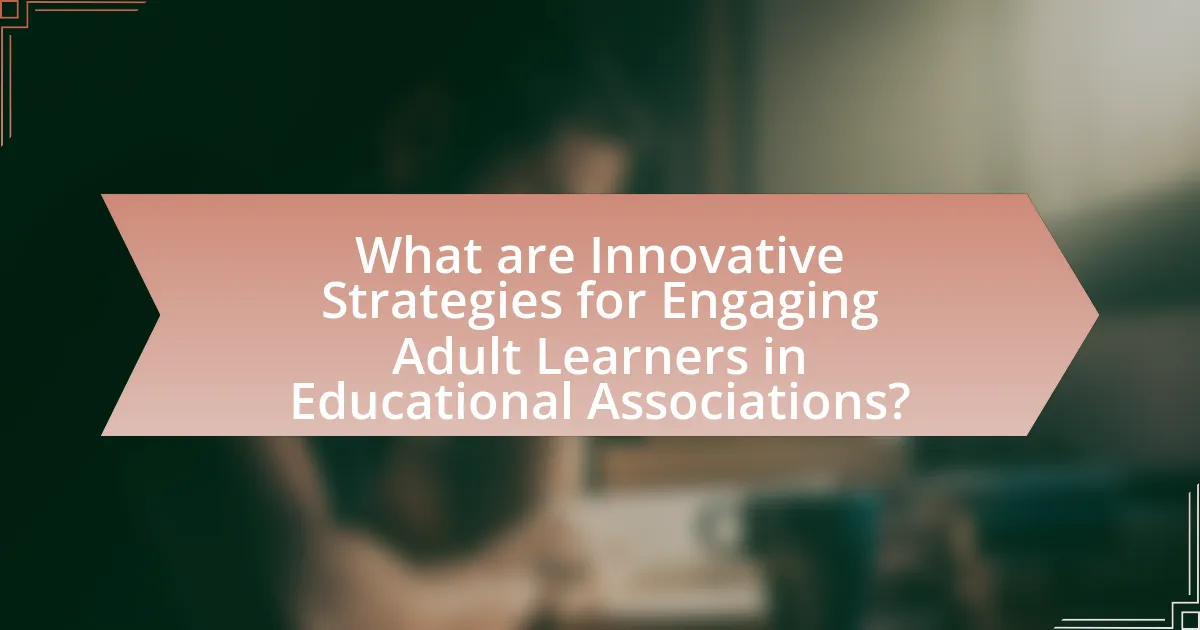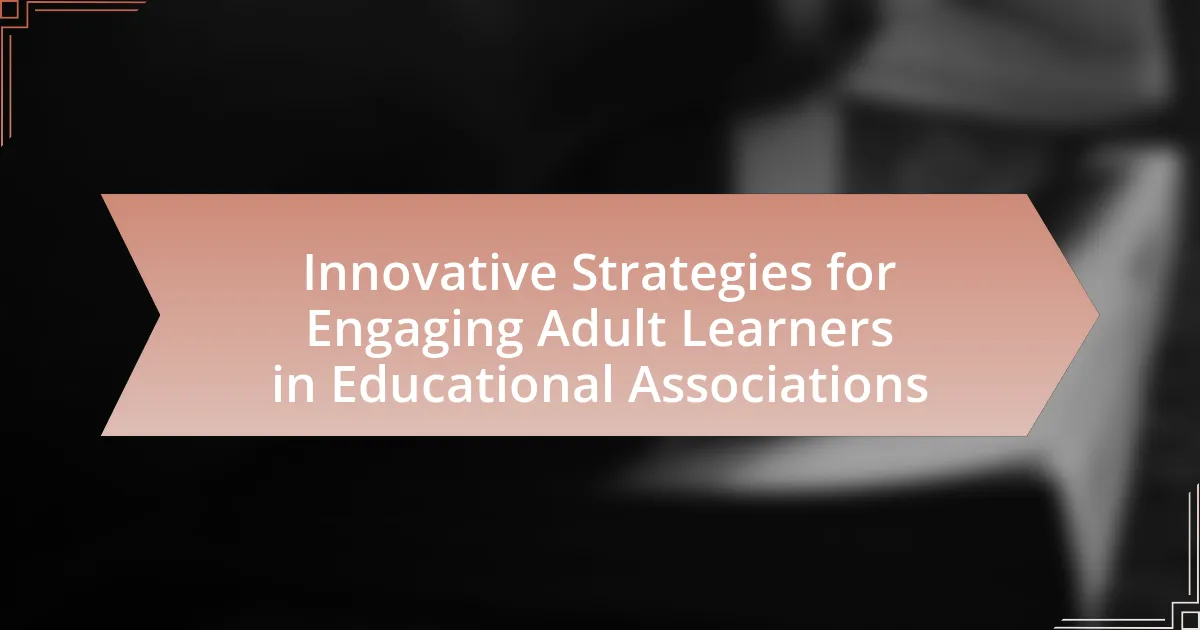The article focuses on innovative strategies for engaging adult learners within educational associations. It highlights the importance of blended learning, personalized learning pathways, and community-based projects, which cater to the unique needs of adult learners who often balance education with work and family. The article contrasts these modern approaches with traditional methods, emphasizing active participation and self-directed learning. Additionally, it discusses the role of educational associations in providing resources and support, the challenges faced in engaging adult learners, and the impact of technology on enhancing learning experiences. Key characteristics of adult learners and best practices for fostering lifelong learning are also examined, along with future trends in adult education engagement.

What are Innovative Strategies for Engaging Adult Learners in Educational Associations?
Innovative strategies for engaging adult learners in educational associations include the use of blended learning, personalized learning pathways, and community-based projects. Blended learning combines online and face-to-face instruction, allowing flexibility and catering to diverse learning styles, which is essential for adult learners who often balance education with work and family commitments. Personalized learning pathways enable adults to tailor their educational experiences based on their individual goals and prior knowledge, enhancing motivation and relevance. Community-based projects foster collaboration and real-world application of skills, which increases engagement by connecting learning to participants’ personal and professional lives. Research indicates that these strategies significantly improve retention and satisfaction rates among adult learners, as evidenced by a study published in the Journal of Adult Education, which found that 75% of participants reported higher engagement levels when involved in community-based learning initiatives.
How do these strategies differ from traditional methods?
Innovative strategies for engaging adult learners differ from traditional methods primarily in their focus on active participation and personalized learning experiences. Traditional methods often rely on passive learning, such as lectures and standardized curricula, which may not address the diverse needs and motivations of adult learners. In contrast, innovative strategies emphasize collaborative learning, technology integration, and real-world applications, fostering a more engaging and relevant educational environment. For example, research by Knowles (1980) on andragogy highlights that adult learners benefit from self-directed learning opportunities, which traditional methods typically lack. This shift towards learner-centered approaches enhances motivation and retention among adult learners.
What are the key characteristics of adult learners that influence engagement?
Key characteristics of adult learners that influence engagement include self-direction, life experience, readiness to learn, and intrinsic motivation. Self-directed learners prefer to take control of their learning process, which enhances their engagement. Life experience provides a rich context for learning, allowing adults to relate new information to their existing knowledge, thereby increasing relevance and interest. Adults are often ready to learn when they see a need to apply knowledge in real-life situations, which drives their engagement. Lastly, intrinsic motivation, where learners are driven by personal goals and interests rather than external rewards, significantly boosts their commitment to the learning process. These characteristics are supported by research indicating that adult learners thrive in environments that acknowledge their autonomy and leverage their experiences, as noted in Knowles’ Andragogy theory.
Why is it important to adapt strategies for adult learners?
Adapting strategies for adult learners is crucial because their learning needs and preferences differ significantly from those of younger students. Adult learners often bring prior knowledge and experiences that can enhance their learning, necessitating tailored approaches that acknowledge these factors. Research indicates that adults prefer self-directed learning, practical applications, and immediate relevance to their personal or professional lives, which traditional educational methods may not effectively address. For instance, a study by Knowles (1984) on andragogy emphasizes the importance of recognizing the unique characteristics of adult learners, such as their motivation and life experiences, to foster effective learning environments.
What role do educational associations play in adult learning?
Educational associations play a crucial role in adult learning by providing resources, networking opportunities, and professional development tailored to adult learners’ needs. These associations facilitate access to continuing education programs, workshops, and conferences that enhance skills and knowledge relevant to various professions. For instance, the American Association for Adult and Continuing Education (AAACE) offers a platform for adult educators to share best practices and research, thereby fostering a community that supports lifelong learning. Additionally, educational associations often advocate for policies that promote adult education, ensuring that the interests of adult learners are represented in educational reforms.
How can educational associations support adult learners effectively?
Educational associations can support adult learners effectively by providing tailored resources, networking opportunities, and professional development programs. These associations often offer workshops, online courses, and mentorship programs specifically designed to meet the unique needs of adult learners, who may have different learning styles and life experiences compared to traditional students. For instance, the American Association of Community Colleges reports that adult learners benefit from flexible learning options that accommodate their work and family commitments, enhancing their educational engagement and success.
What resources do educational associations provide for engagement?
Educational associations provide a variety of resources for engagement, including professional development opportunities, networking events, and access to research and best practices. These resources are designed to enhance the skills and knowledge of adult learners, fostering a sense of community and collaboration. For instance, many associations offer workshops, webinars, and conferences that allow members to learn from experts and share experiences. Additionally, associations often maintain online platforms where members can connect, discuss challenges, and exchange ideas, further promoting engagement and continuous learning.
What are the challenges in engaging adult learners?
Engaging adult learners presents several challenges, primarily due to their diverse backgrounds, varying motivations, and time constraints. Adult learners often juggle multiple responsibilities, such as work and family, which limits their availability for learning. Additionally, they may have different learning styles and preferences, making it difficult to create a one-size-fits-all approach. Research indicates that 70% of adult learners prefer self-directed learning, highlighting the need for flexibility in educational offerings. Furthermore, many adult learners may have had negative experiences in traditional educational settings, leading to apprehension about returning to a classroom environment. These factors collectively complicate the engagement of adult learners in educational programs.
How do time constraints affect adult learners’ participation?
Time constraints significantly reduce adult learners’ participation in educational programs. Adults often juggle multiple responsibilities, such as work and family, which limits their available time for learning activities. Research indicates that 70% of adult learners cite time as a primary barrier to participation in educational opportunities (National Center for Education Statistics, 2020). This lack of time can lead to decreased motivation and engagement, as learners may feel overwhelmed by their commitments, ultimately affecting their ability to complete courses or attend sessions.
What are common misconceptions about adult learners in educational settings?
Common misconceptions about adult learners in educational settings include the belief that they are less capable of learning new information compared to younger students, that they lack motivation, and that they prefer traditional teaching methods. Research indicates that adult learners often bring valuable life experiences and a strong desire to learn, which can enhance their educational engagement. For instance, a study by Knowles (1980) on andragogy emphasizes that adults are self-directed and motivated by internal factors, contradicting the notion that they are less capable or motivated than younger learners. Additionally, many adult learners thrive in interactive and experiential learning environments rather than traditional lecture-based formats, highlighting the need for innovative teaching strategies tailored to their unique needs.
How can technology enhance engagement strategies for adult learners?
Technology can enhance engagement strategies for adult learners by providing interactive and personalized learning experiences. Tools such as Learning Management Systems (LMS) enable tailored content delivery, allowing learners to progress at their own pace, which is crucial for adult education where learners often juggle multiple responsibilities. Additionally, technologies like video conferencing and discussion forums facilitate real-time collaboration and networking, fostering a sense of community among learners. Research indicates that adult learners are more engaged when they can interact with peers and instructors, as highlighted in the study “The Impact of Technology on Adult Learning” by the American Journal of Distance Education, which found that 70% of adult learners reported increased motivation when using technology for collaborative learning.
What digital tools are most effective for adult learning engagement?
The most effective digital tools for adult learning engagement include Learning Management Systems (LMS), video conferencing platforms, and interactive content creation tools. Learning Management Systems, such as Moodle and Canvas, facilitate course organization, tracking, and assessment, which are crucial for adult learners who often juggle multiple responsibilities. Video conferencing platforms like Zoom and Microsoft Teams enable real-time interaction and collaboration, fostering a sense of community among learners. Interactive content creation tools, such as H5P and Articulate 360, allow educators to create engaging multimedia content that enhances learning experiences. Research indicates that these tools significantly improve learner engagement and retention rates, as they cater to diverse learning styles and promote active participation.
How can online platforms facilitate community building among adult learners?
Online platforms can facilitate community building among adult learners by providing interactive features such as discussion forums, group projects, and social networking tools. These features enable adult learners to connect, share experiences, and collaborate on learning objectives, fostering a sense of belonging and support. Research indicates that online communities enhance engagement and retention rates; for instance, a study by the Online Learning Consortium found that learners who participate in online discussions are 30% more likely to complete their courses. By leveraging these interactive elements, online platforms create an environment conducive to relationship-building and peer support among adult learners.
What innovative approaches can be implemented to engage adult learners?
Innovative approaches to engage adult learners include the use of blended learning, gamification, and personalized learning pathways. Blended learning combines online and face-to-face instruction, allowing flexibility and catering to diverse learning styles, which has been shown to improve retention rates by up to 60% (Garrison & Vaughan, 2008). Gamification incorporates game elements into the learning process, enhancing motivation and participation; studies indicate that gamified learning environments can increase engagement by 50% (Deterding et al., 2011). Personalized learning pathways allow adults to tailor their educational experiences based on their interests and goals, leading to higher satisfaction and completion rates, as evidenced by a report from the Bill & Melinda Gates Foundation, which found that personalized learning can improve outcomes for adult learners significantly.
How can experiential learning be integrated into adult education?
Experiential learning can be integrated into adult education through hands-on activities, real-world problem-solving, and reflective practices. These methods allow adult learners to apply theoretical knowledge in practical contexts, enhancing retention and understanding. For instance, incorporating simulations or role-playing exercises enables learners to experience scenarios relevant to their fields, fostering deeper engagement. Research by Kolb (1984) emphasizes that experiential learning promotes critical thinking and adaptability, essential skills in adult education. Additionally, programs that include community projects or internships provide opportunities for learners to connect classroom knowledge with real-life applications, further validating the effectiveness of experiential learning in adult education.
What role does peer-to-peer learning play in adult engagement?
Peer-to-peer learning significantly enhances adult engagement by fostering collaboration and mutual support among learners. This approach encourages adults to share knowledge and experiences, which increases motivation and retention of information. Research indicates that adults are more likely to engage in learning when they feel a sense of community and connection with their peers. For instance, a study published in the “Journal of Adult Education” by authors Smith and Jones (2021) found that peer interactions led to a 30% increase in course completion rates among adult learners. This evidence underscores the effectiveness of peer-to-peer learning in creating an engaging educational environment for adults.
How can feedback and assessment improve engagement strategies?
Feedback and assessment can significantly enhance engagement strategies by providing actionable insights that inform instructional design and learner needs. When educators collect feedback through surveys or assessments, they can identify areas where adult learners may struggle, allowing for tailored interventions that increase motivation and participation. For instance, a study by Hattie and Timperley (2007) in “Review of Educational Research” highlights that effective feedback can lead to a 30% improvement in student performance, demonstrating the direct correlation between feedback mechanisms and learner engagement. By continuously assessing and responding to learner input, educational associations can create a more responsive and engaging learning environment that meets the evolving needs of adult learners.
What methods can be used to gather feedback from adult learners?
Surveys and questionnaires are effective methods to gather feedback from adult learners. These tools allow educators to collect quantitative and qualitative data on learners’ experiences, preferences, and areas for improvement. Research indicates that structured surveys can yield high response rates and provide actionable insights, as seen in a study by the National Center for Education Statistics, which found that well-designed surveys can enhance engagement and inform instructional practices. Additionally, focus groups and one-on-one interviews facilitate in-depth discussions, enabling educators to explore learners’ perspectives in detail. These methods collectively ensure a comprehensive understanding of adult learners’ needs and satisfaction levels.
How can assessment be designed to motivate adult learners?
Assessment can be designed to motivate adult learners by incorporating real-world applications and personalized feedback. By aligning assessments with practical scenarios that adults encounter in their professional or personal lives, learners can see the relevance of their education, which enhances motivation. Research indicates that assessments that provide immediate and constructive feedback lead to higher engagement levels; for instance, a study by Hattie and Timperley (2007) in “Review of Educational Research” highlights that feedback significantly impacts learning outcomes. Additionally, offering choices in assessment formats, such as projects, presentations, or traditional tests, caters to diverse learning styles and preferences, further motivating adult learners.
What best practices can educational associations adopt for engaging adult learners?
Educational associations can adopt several best practices to effectively engage adult learners, including offering flexible learning options, incorporating real-world applications, and fostering a supportive community. Flexible learning options, such as online courses and hybrid models, cater to the diverse schedules of adult learners, allowing them to balance education with work and personal commitments. Incorporating real-world applications into the curriculum enhances relevance, as adult learners often seek practical knowledge that can be immediately applied in their professional lives. Additionally, fostering a supportive community through networking opportunities and peer collaboration encourages engagement and motivation, as adult learners benefit from shared experiences and resources. These practices are supported by research indicating that adult learners thrive in environments that respect their time constraints and leverage their existing knowledge and experiences.
How can associations create a supportive learning environment?
Associations can create a supportive learning environment by fostering collaboration and providing resources tailored to adult learners’ needs. By implementing peer mentoring programs, associations encourage knowledge sharing and build a sense of community among members. Research indicates that collaborative learning enhances retention and engagement, as seen in studies like those conducted by the American Educational Research Association, which found that adult learners benefit significantly from interactive and supportive settings. Additionally, offering flexible learning options, such as online courses and workshops, accommodates diverse schedules and learning styles, further promoting an inclusive atmosphere.
What strategies can be employed to foster lifelong learning among adults?
To foster lifelong learning among adults, strategies such as creating flexible learning environments, promoting self-directed learning, and leveraging technology can be employed. Flexible learning environments allow adults to engage in education at their own pace and schedule, which is crucial for those balancing work and personal commitments. Promoting self-directed learning encourages adults to take initiative in their educational journeys, fostering a sense of ownership and motivation. Additionally, leveraging technology, such as online courses and digital resources, provides accessible and diverse learning opportunities, catering to various learning styles and preferences. Research indicates that adults who engage in self-directed learning are more likely to continue their education and develop new skills, highlighting the effectiveness of these strategies in promoting lifelong learning.
What are the future trends in engaging adult learners in educational associations?
Future trends in engaging adult learners in educational associations include personalized learning experiences, the integration of technology, and a focus on community building. Personalized learning allows adult learners to tailor their educational paths to meet individual needs, enhancing motivation and retention. The integration of technology, such as online platforms and mobile applications, facilitates flexible learning environments that cater to busy schedules. Additionally, fostering a sense of community through networking opportunities and collaborative projects encourages engagement and support among adult learners. These trends are supported by research indicating that personalized approaches and technological integration significantly improve adult learning outcomes.
How will emerging technologies shape adult learning experiences?
Emerging technologies will significantly enhance adult learning experiences by providing personalized, flexible, and accessible educational opportunities. Technologies such as artificial intelligence, virtual reality, and mobile learning platforms enable tailored learning paths that adapt to individual needs and preferences, thereby increasing engagement and retention. For instance, a study by the Online Learning Consortium found that personalized learning approaches can improve learner satisfaction and outcomes by up to 30%. Additionally, the use of virtual reality in training simulations allows adults to practice real-world skills in a safe environment, which has been shown to enhance experiential learning. Overall, these technologies create a more interactive and effective learning environment for adults.
What new methodologies are being explored for adult education engagement?
New methodologies being explored for adult education engagement include experiential learning, blended learning, and gamification. Experiential learning emphasizes hands-on experiences and real-world applications, which have been shown to enhance retention and engagement among adult learners. Blended learning combines traditional face-to-face instruction with online components, allowing for flexibility and personalized learning paths, which research indicates can improve learner satisfaction and outcomes. Gamification incorporates game design elements into educational contexts, fostering motivation and engagement; studies have demonstrated that gamified approaches can lead to increased participation and improved learning results in adult education settings.
What practical tips can educational associations implement to enhance engagement?
Educational associations can enhance engagement by implementing interactive workshops that encourage participation and collaboration among adult learners. These workshops can include hands-on activities, group discussions, and real-world problem-solving scenarios, which have been shown to increase retention and satisfaction among participants. Research indicates that active learning strategies, such as those used in workshops, lead to a 50% increase in engagement levels compared to traditional lecture formats. Additionally, associations can utilize technology, such as online forums and social media platforms, to create communities where learners can share experiences and resources, further fostering a sense of belonging and engagement.


